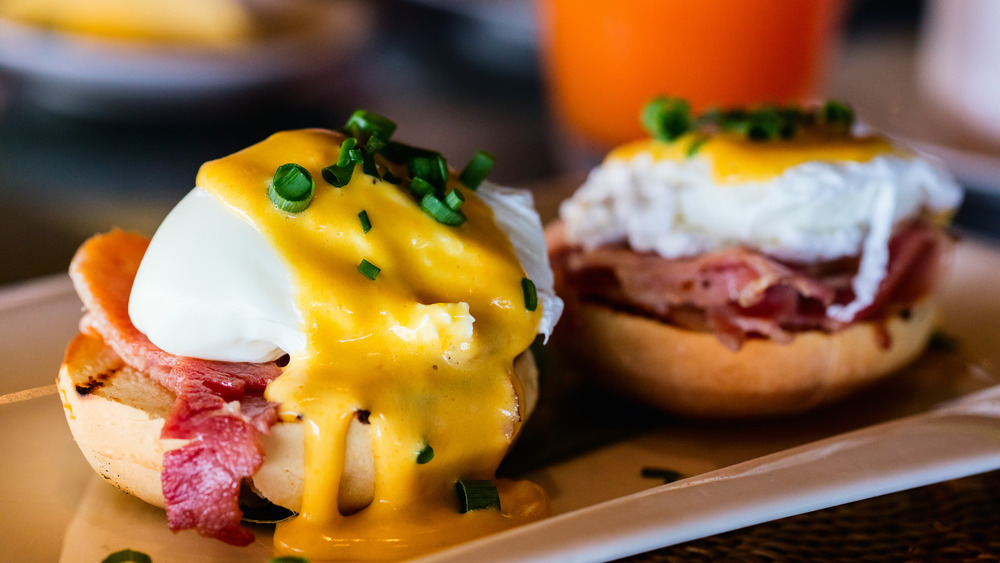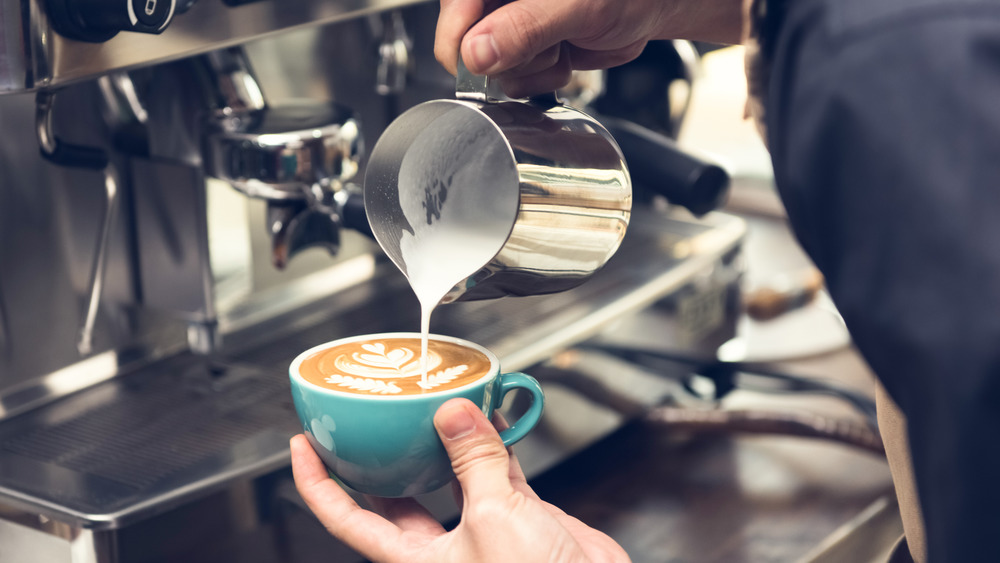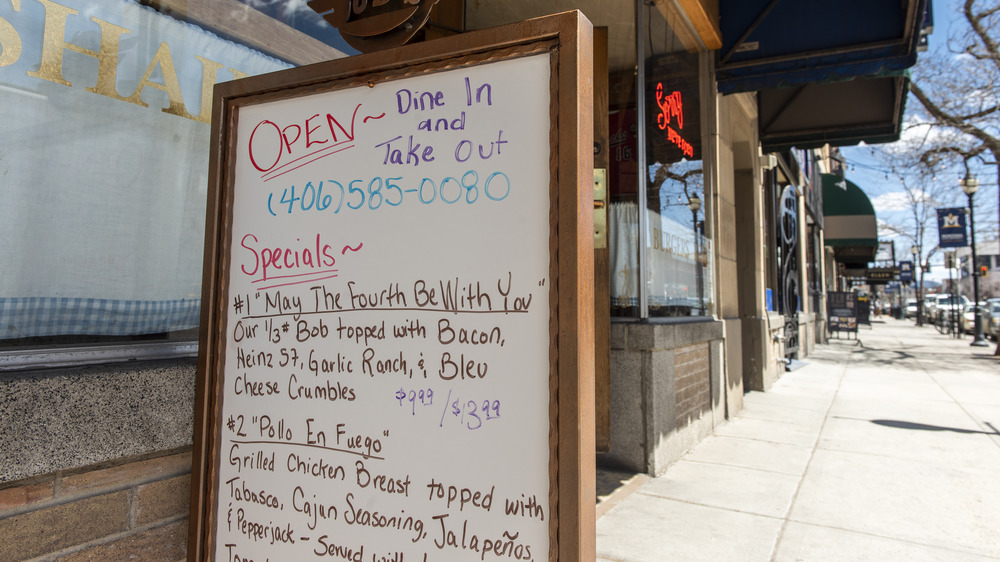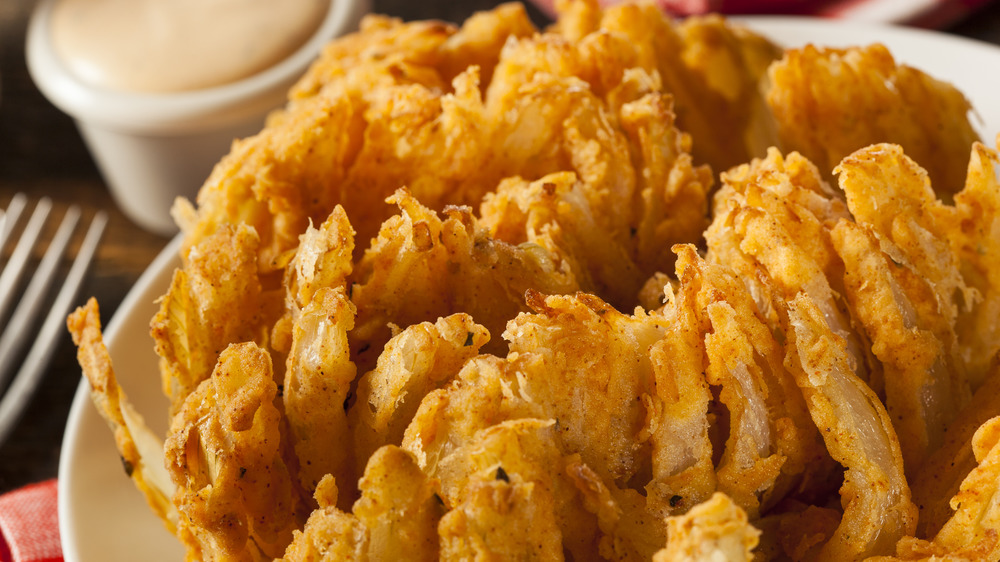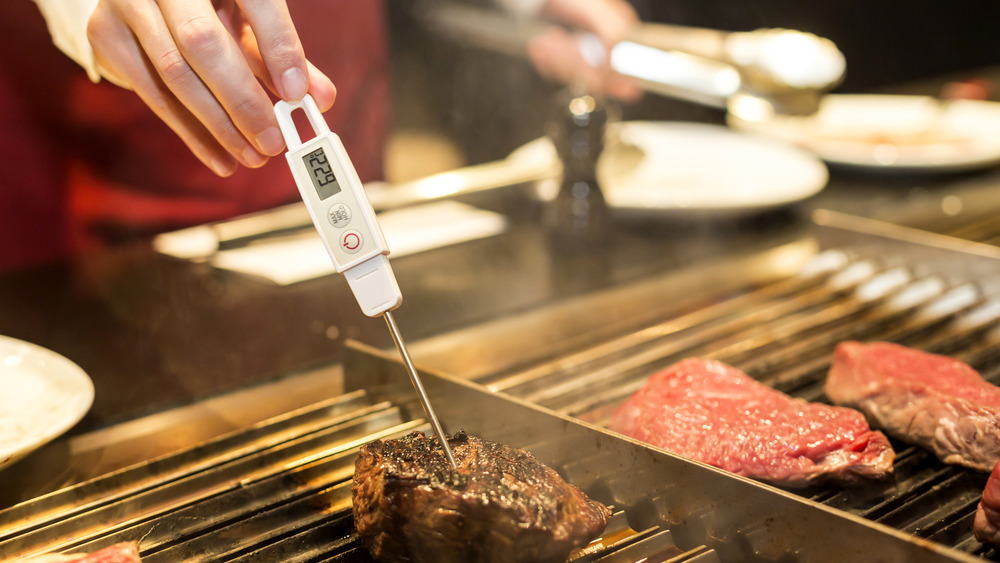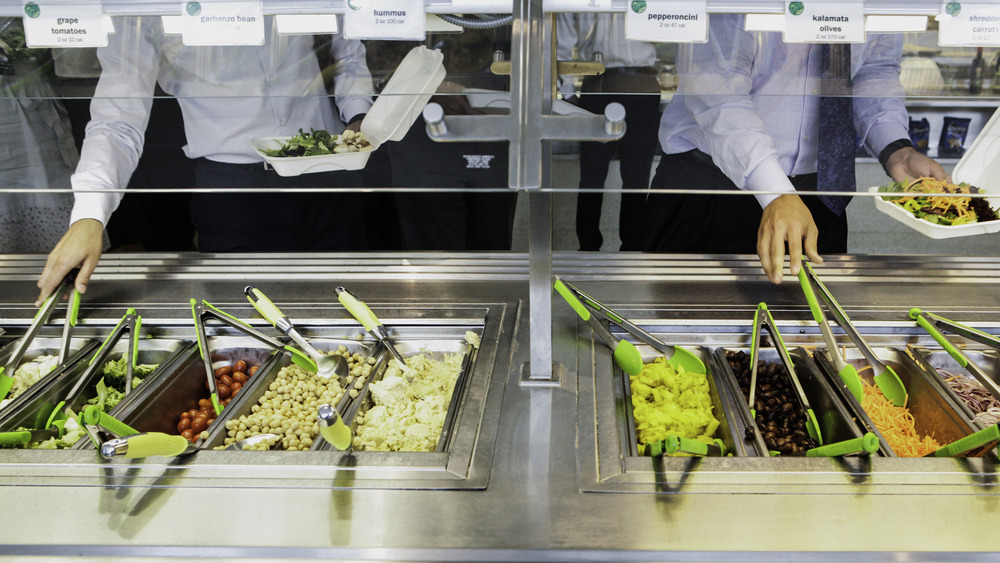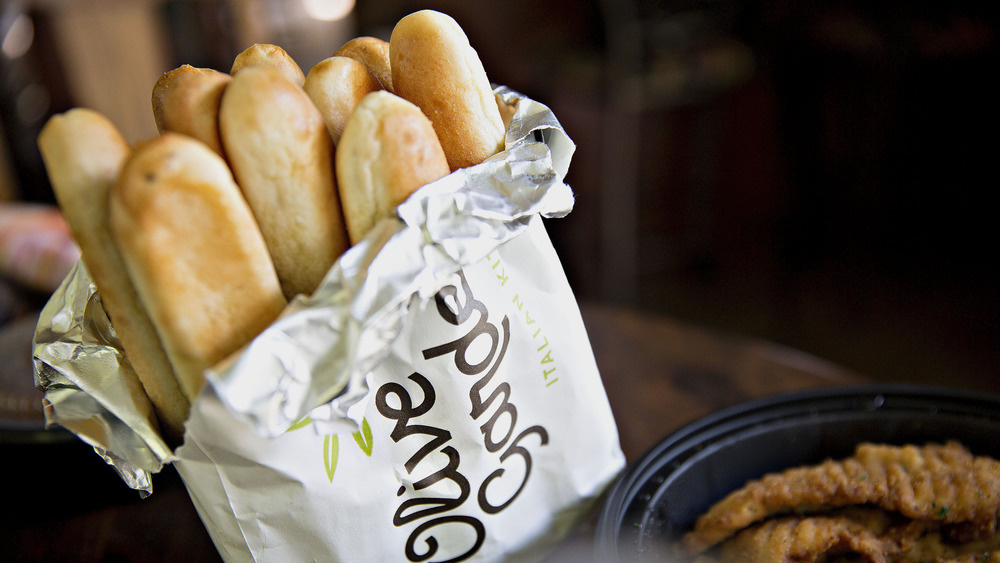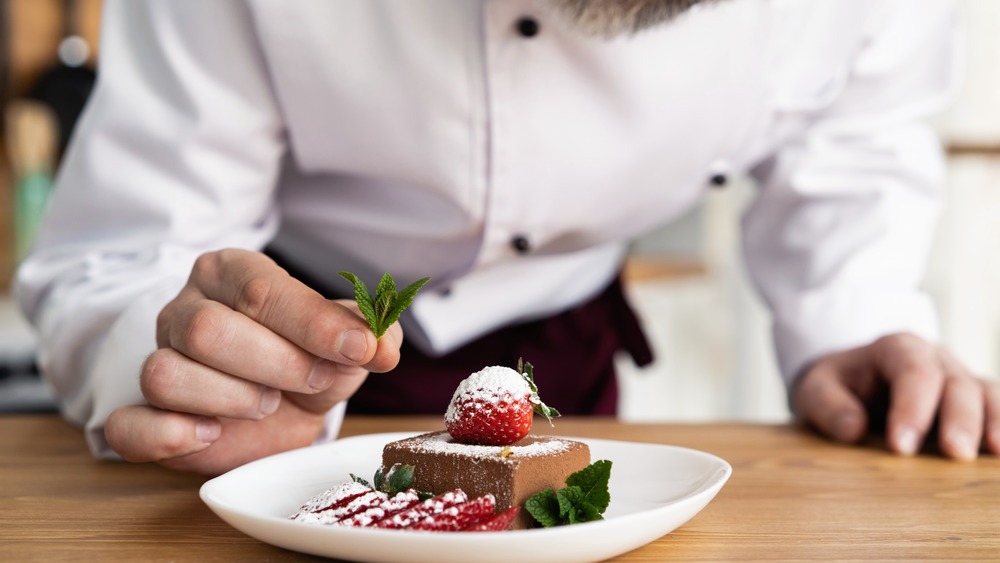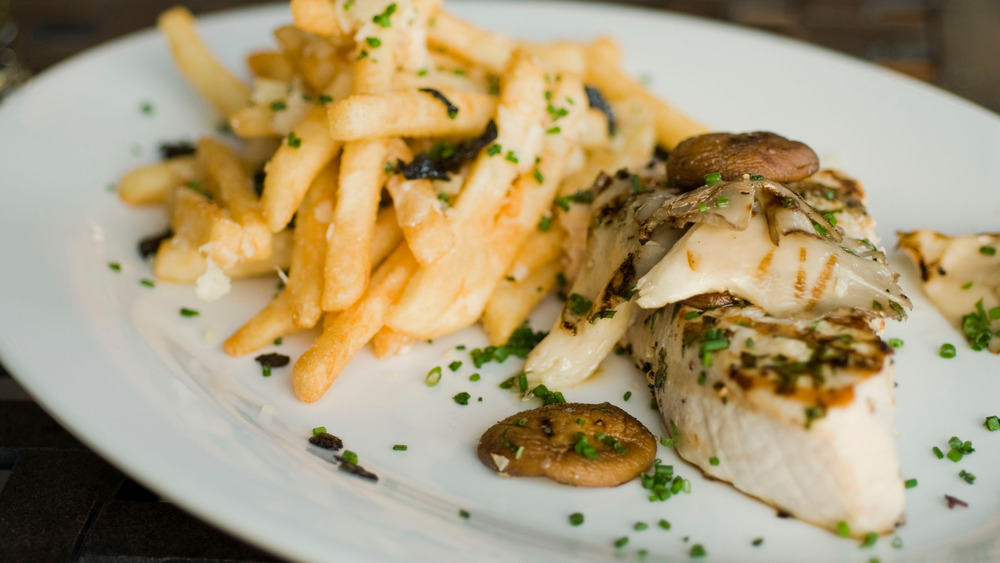Foods That Even Restaurant Servers Won't Eat
Restaurant servers are privy to a wide array of knowledge that the average consumer is not, such as where your restaurant food comes from, how it's cooked, what you should order — and definitely what you shouldn't. However, a restaurant server can't exactly look you in the eye while taking your order and warn you away from the restaurant's bread basket or swordfish special. Remember that their bosses are probably going to frown on that kind of behavior, especially considering that many of the items that you shouldn't order are that way because of restaurants' efforts to cut cost or increase productivity — or sometimes just sheer laziness on the restaurant's part.
One thing that restaurant servers can do, though? Go online and anonymously let the world know what to stay away from when dining out at just about any restaurant, whether you're headed to a well-known casual dining chain or a local spot. Unfortunately, they all face similar downfalls. Check out what the world of restaurant servers says you should avoid at all costs the next time you're dining out. These items are bad choices for a whole host of reasons, from the threat of food poisoning to overpricing. There are good reasons restaurant servers avoid them. Here's why you should, too.
Steer clear of the eggs Benedict
Hollandaise sauce is a French concoction made from emulsified butter, egg yolks, lemon juice, and salt. While it's sometimes seen coating poached fish or asparagus, it's probably most well known as the finishing touch to a plate of that favorite brunch classic — eggs Benedict. Unfortunately, as scrumptious as eggs Benedict can be, Eater reports that hollandaise sauce is particularly notorious for causing food poisoning, as the egg yolks in the sauce are not fully cooked before serving and the sauce isn't kept at a temperature high enough to kill any bacteria. For this reason, many restaurant servers warn restaurant diners to avoid the eggs benedict on their favorite brunch menus, unless the restaurant is obviously turning over a high enough quantity of eggs benedict to ensure that the hollandaise sauce isn't sitting around for a while.
On one Reddit thread asking chefs and waiters of Reddit to reveal what they always avoid when dining out, one commenter noted, "I don't trust hollandaise sauce to not come from a jacuzzi of aged bacterial growth." It's a sentiment that late chef Anthony Bourdain backed up in his book Kitchen Confidential, noting that bacteria proliferate in hollandaise and, even worse, "Nobody I know has ever made hollandaise to order."
Restaurant servers say to take your coffee black
Like your coffee with a splash of milk? You might want to start taking your coffee black whenever you dine out. At least, you probably will after you hear what some restaurant servers, baristas, and bartenders have to say about the milk that ends up in your coffee. According to Redditors in the industry, if a restaurant worker doesn't rinse out a milk pitcher after steaming milk for your coffee, it results in a steam wand with crusty, cooked milk stuck on it, which comes in contact with your coffee — yum! Anything leftover in the pitcher will also grow bacteria and/or mold over time. Likewise, some commentators reported that some restaurants mix and match milk in one pitcher. In other words, if you ordered almond milk for dietary reasons, you could have some remnants of regular milk in there as well, spelling a pretty bad night for someone with lactose intolerance or other food allergies.
The same no-milk principle also applies to cocktails that contain dairy, like White Russians. As one bartender on r/AskReddit notes, "There are hardly any drinks with milk, meaning hardly any milk is used. That partially-used quart they have behind the bar may have been sitting there for QUITE a while."
Order off the regular menu if you prefer fresh things
Imagine you're a restaurant manager. Did your restaurant serve up some salmon over the weekend, but didn't sell enough? You know, that'll make some great fish taco specials on Monday and, if you're lucky, you'll get rid of all the salmon that's on the verge of expiring. At least, that's what servers on Reddit say is going through most chefs' minds when they come up with the specials of the day.
"The daily specials are usually made up of ingredients that are the oldest in the kitchen," one Redditor explains. Others chime in with simple agreements like "duh." There are certainly quite a few industry articles written on how to make use of leftover food for chef specials, versus throwing food out and taking a loss (via McDonald Paper Restaurant Supplies). Of course, while there may not be anything necessarily wrong with this leftover food and it could be certainly safe to eat in the legal sense, it still might not be the freshest item on the menu.
Some Redditors did jump in on the same thread to defend daily specials, saying that chefs may use them to test out a future regular menu item or to use up genuinely fresh ingredients on which they got a good deal. However, if you want to play it safe, stick to what a restaurant is best known for and something that gets a fair amount of turn-over.
Yes, you should be suspicious of that odd menu item, restaurant servers warn
Do you ever take a look at a menu, see a particular item, and scratch your head wondering how exactly it got there? Like macaroni and cheese at a Mexican restaurant or fish tacos at an Irish pub? Chinese fare at a diner or a burger at an Italian joint? Those items seem out of place for a good reason. They don't make sense, are part of the menu as an appeal to a larger crowd, and often aren't in the chef's wheelhouse.
A Redditor who says they've worked in the restaurant industry for a decade, working in just about every restaurant role, explains that ordering one of these suspicious menu items is one of the top mistakes a diner can make. "Order dishes that are 'on brand,'" they cautioned. "Don't order the steak at a seafood restaurant, don't order the pizza at a fine dining restaurant, etc. You'll get s***ty food if you order something they only have on the menu out of obligation."
That signature appetizer probably isn't a good idea
If going out to dinner is a special occasion for you and you care about having a nice experience that you can't replicate at home, it's typically a good idea to avoid any "signature" appetizers that you might see on a range of menus at any restaurant down the street (think wings or chips and dip, for instance). You're not actually getting anything special, according to one Redditor in the industry.
"Don't order appetizers. 99% of corporate and local restaurants appetizers are frozen and made by big corporations or some off brand never heard of company," they say. "Nearly every place you eat that has 'spinach artichoke dip' is frozen in a bag and made by Nestle. Those 'beer-battered onion' rings you love so much, they're more than likely the cheapest pre-breaded, pre-fried brand the restaurant can get a hold of."
In the Reddit thread, the original commenter also points out that appetizers are just in general really high-priced and bad for you. The only exclusions they say you might want to consider if you're really craving an app? Nachos, as they're normally made to order, including frying the chips and cooking any meat toppings.
Ask your restaurant servers for water without the lemon
Ordering your water with lemon at a restaurant is pretty standard. Even if you don't specifically ask for lemon in your water, it's no surprise to find that your water comes with the lemon already tossed in. Sometimes, you might even get your glass of soda topped with a lemon wedge. However, some servers that have worked in high-volume restaurants caution you to request your drink without the lemon next time.
"Servers clean off food, touch the food screen, handle many used pens, and do a lot of other things with their hands," said one poster. "There isn't always time to wash your hands between taking a drink order and grabbing those lemons. It's a big source of cross contamination." Only in restaurants with a lower turn-around, they explain, do the servers often have time to wash their hands or grab some tongs before adding a lemon slice to every drink. Consider also that, if the restaurant really has that low of a turn-around, you may run into the worry of whether or not the food is as fresh as it could be.
If you want good steak, servers say not to order it well-done
Regardless of where you stand on the perfect steak temperature, one thing is pretty certain — if you order a steak well done, you're setting yourself up for disappointment. When you order a steak that's going to be cooked to that high of a temperature, some chefs, according to the restaurant workers of Reddit, will use that extra cooking time as a way to disguises flaws in your steak — whether that flaw is a poor-quality cut of meat or just a cut of meat that's kind of ugly.
One commenter on Reddit says, " I've heard that if you order a well-done steak you'll get an older cut of meat [that's] less-than-fresh qualities can be hidden by a longer cook time" and others chime in saying, "most places aren't going to give you the best looking steak if you want it well done." Yet a third restaurant worker says, " Not necessarily older, but well done is definitely a chance to dump the less-desirable cuts with bad marbling, because it can be concealed easier. People who order mid-rare usually get the best cuts and they go out looking like a beautiful picture from a magazine. Well done is a blackened charred hunk of cow that might or might not have spent a few minutes in the microwave."
For the best steak possible, learn to love a steak with a bit of red. Well-done steak just isn't that great, anyway.
Stay away from the salad bar if you know what's good for you
There are many reasons why diners love salad bars. You can fill up a plate with as much salad goodness as you want and go back to the bar multiple times for more food. You can make your plate exactly the way you want it, rather than relying on the chef to create your version of the perfect salad. There's usually no wait for a salad bar salad, either. You can just place your order and the server will hand you a plate and tell you to have at it.
However, there are some downsides to the salad bar, as restaurant workers can attest. One Pizza Hut employee came to the chain's defense on Reddit, but noted that even on the salad bar, old items would be kept out for multiple days, saying, "In regards to the salad bar, most items from the previous day would be kept on the salad bar [...] You would put enough of the fresh item in to make a full container then dump the older stuff on top." Salad bar items would only be thrown away once they became "slimy."
Another worker from an unspecified location seconds this, saying that the salad bar items are just kept until they're used up. If you do like the salad bar, it seems that the key to a more fresh salad is to avoid the less popular toppings, like chickpeas or tofu.
Maybe pass on the free bread, restaurant servers caution
You sit down at your restaurant of choice, the server fills your water glass, and then they plop down a basket of free bread served alongside butter or another yummy spread. Great! What's better than free bread, after all? Unfortunately, a lot, because while that bread might be free, it might not be that fresh. One server speaking to Reader's Digest specifically mentioned the bread baskets, saying, "With low-carb diets being so popular, we get a lot of breadbaskets back that aren't touched or only have a piece or two missing. When we're rushed sometimes we'll just spruce it up a little and take it out to the next table. If you really want the bread, order it differently from how it's usually served — so if all the tables have it sliced, ask for the loaf whole."
The one place where you actually might be able to rely on the free bread being fresh? According to servers posting on Reddit, it could be Olive Garden. The high turn-over rate for the restaurant's free breadsticks means that most of the time, the breadsticks arriving at your table are fresh out of the oven and covered in butter and salt.
The plate garnish is just for looks, servers say
If you've ever received a prettily plated dish at a restaurant and been tempted to eat the plate garnish (after all, it is edible), wait just a second — and maybe take an extra step and take it off your plate, too. You may not want to let it touch or get mixed in with your food. One restaurant worker told Reader's Digest that "most people don't eat the garnishes on the plate anyhow, but I definitely wouldn't after seeing how many times a chef will grab a leaf of kale or whatever off an incoming plate and drop it onto one going out to customers. We have one dish that has a scoop of cottage cheese on the side. If it doesn't look touched, the chef will just slide it onto the next plate, or at the end of the night, right back into the container."
So, if you'd rather not eat something that's been on someone else's dirty dishes, look out for that garnish and try not to touch it.
There's one kind of seafood to avoid and it's not sushi
When ordering seafood at a restaurant, if you want to be extra safe (at least where possible food-borne illnesses are concerned), you likely know to avoid sushi. It's raw fish, after all, which, by nature comes with a little more risk. While that might be true in some instances, it's not the sushi that most restaurant servers say to avoid. Instead, they're telling diners to stay away from the swordfish.
One Redditor shared some particularly unappetizing details, saying, "I've seen a chef cutting up and cleaning [a swordfish] before and it's not pretty. Let's just say a fish that size picks up a good deal of parasites during its lifetime, and they all start jumping ship at once when they figure out their host is dead..."
Beyond the threat of parasites, other commenters mention that many fish markets sell old swordfish rather than fresh. The parasite issue isn't only limited to swordfish either, according to the thread, and can also be an issue with other types of saltwater fish, especially, as one commenter notes, in larger and older fish that have more time to collect unwanted ridealongs. Plus, given how big swordfish can get, there's a chance swordfish contains an alarming amount of mercury.
Servers say you really should spring for the "better" bottle of wine
When ordering a bottle of wine out at a restaurant, you may just assume that going with the house wine means you'll be getting a good deal on an affordable bottle of decent wine — and if you're by no means a wine connoisseur, you'll likely find the house wine totally to your liking. However, Reddit servers say you should really just spring for the "better" bottle of wine, rather than opting for the house variant, both for quality and cost reasons. Additionally, don't order by the glass. Instead, go for the whole bottle.
One commenter on r/AskReddit explains why: "If you order house wine, you're drinking the cheapest goon the bar manager thinks he can get away with. If you order a single glass of something that isn't the house wine, you're rolling the dice on when the bottle was opened, and your odds aren't good." They advise you to purchase a bottle that's at least $20 more expensive than the house wine. That way, you'll enjoy a better wine and, at least usually, the restaurant will give you a bit better service, too, on the assumption that you're a "big spender." And if you can't stand the thought of spending more than $50 on a bottle of wine at a restaurant, just go with beer or liquor.

